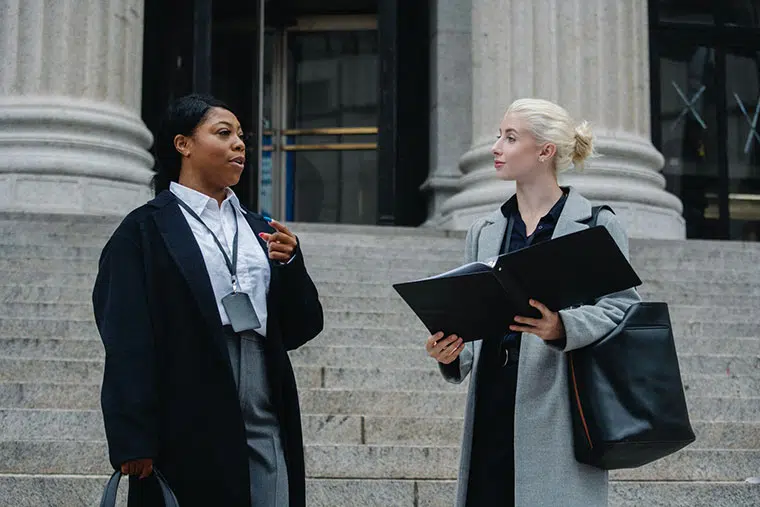What is a Surety in Canada?
If a friend or someone you care about gets arrested and is kept in custody until their bail hearing, they or their lawyer might ask you to be their surety. What does it mean to be a surety? Who qualifies to be a surety? What do you need to do to become a surety, and what are your duties?
These are common questions that people in this situation want answered. This is why this blog post exists. Use this guide to learn what you need to know about being a surety in Ontario. Your first step, though, should be to call a good Toronto criminal lawyer right away. They can help represent your friend or family member if they don’t have a lawyer yet. The time right after someone is charged with a crime is very important. This sets the stage for how the case will go and how it will end. You should also speak to a criminal lawyer if you have questions about being a surety for your specific situation.
What is a Surety?
The general meaning of a surety is a person who agrees to pay money or do something if someone they support does not keep their promises. In the criminal justice field, being a surety means signing a court paper. This makes you responsible for a person charged with a crime until their case is done. This process can take several months or even years. You cannot get paid for being a surety.
There’s more to it than that. It is important to know a little about criminal law. You should specifically know what a bail hearing is before we go into more detail.
What are a Bail Hearing and a Surety’s Role in it?
If the police arrest someone for a crime, they can either let them go or keep them in custody.
If the police choose not to let someone go after an arrest, they must either take them to court or use a video link to connect them to a court for a bail hearing within 24 hours of the arrest. A judge or a justice of the peace will hold the hearing. They will decide if the accused can go back to the community until their trial or if they must stay in jail during that time.
The Crown prosecutor will choose whether to agree to or fight the bail request after seeing a brief overview of the investigation against the accused and their past crimes. If they agree, they will want promises that the accused will attend court and behave well while out on bail. If they fight the bail request (for example, if the accused has broken probation rules in Ontario), there will be a bail hearing. During this hearing, the Crown and the Defense will present their arguments for and against bail. If the court decides to grant bail, it will also want some guarantees.
That’s where a guarantee comes in. The Crown or court often asks for bail conditions that can include:
- A curfew.
- A ban on weapons, drinking, and drug use.
- A rule not to contact the victim, especially if the charges involve making threats.
They will want someone who knows the accused to watch over them and make sure they follow those rules. Another common bail rule is that the accused has to live with their supervisor. To be a supervisor, a person must be over 18 years old, be a Canadian citizen or have landed status, and not be involved in the alleged crime in any way.
Whether the accused is told to stay with you or not, if you act as a guarantor, you are also taking on the duty to:
- Make sure the accused comes to court when they need to.
- Check that the accused follows all the rules of the bail order (also known as Bail Agreement).
- Call the police if the accused breaks any of their bail rules.
You need to sign a form saying that you will pay a fine if the person you are helping skips a court date or breaks a bail rule. The amount you agree to pay usually depends on how serious the charge is. The person you are helping, or you for them, might have to leave money as a deposit or not. You may also need to sign a paper showing that you know what being a surety means.
If you feel you cannot take on the responsibility, you can ask someone to help by being a co-surety, or you can just say no. Being a surety is a big responsibility. You should only take it on if you feel you can manage it.
What Does the Court Look at When Deciding to Let Someone Be a Guarantor?
If the Crown agrees to bail and asks for a guarantee, they will talk to that person. They want to see if the person is ready and fit to take on this role. They need to know if the guarantee can handle their duties as a supervisor for the accused. They may also ask if this person has the money needed for the bail amount. The Crown is worried about:
- The safety of the community and any victims of the person accused.
- Where the accused will stay.
- What rules and limits are good for the accused while out on bail.
- Programs the accused should join, like counseling.
If the Crown fights against bail and a bail hearing starts, the surety will probably provide evidence. This will include answering direct questions from the Defence and questions from the Crown. The judge or justice of the peace will make a decision based on the facts of the case and the background of the accused. They must feel certain that the surety can be responsible for the accused.
A possible surety will usually need to answer questions about their:
- A person’s past, including if they have any criminal records, what they were for, and how long ago they happened.
- Their connection to the person accused.
- Their skill to oversee the person accused.
- Their knowledge of what they must do and their duties.
- Their readiness to inform if the person accused breaks their rules.
If the accused gets bail, a bail agreement is written. This document has details like the terms of the bail.
What If You Change Your Mind About Being a Surety?
Being a surety is a choice, so you don’t need a reason to change your mind. If you want to stop being a surety, you can go to court with the accused and talk to a judge. You should only do this if it is safe. Then, bail will be taken away, and a warrant will be made for the arrest of the accused.
What happens if someone breaks a rule of their bail?
If the accused does not come to court or does not follow their bail conditions, they can face new criminal charges. Here are the repercussions for you as a guarantor:
- If the person breaks their rules, the Crown can ask the court to make you pay the money you promised.
- If the Crown wins, a hearing called estreatment will happen. You and the person accused will get notice of at least ten days about the hearing’s time, date, and place.
- At the hearing, you must explain why you should not have to pay the money.
- The judge might tell you to pay all, some, or none of the amount you promised.
- You may need to deal with more legal actions to collect the money that is owed.
What occurs to a deposit when the case is done?
No matter if you or the accused gave a deposit, that money goes back to the accused. It does not go to the person who guaranteed it.


